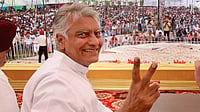With the central government reversing its new guideline on home quarantine, the Delhi government can now heave a sigh of relief. The tussle between Delhi Chief Minister Arvind Kejriwal and the central government over the new rules rolled out by Lt Governor Anil Baijal had led to chaos in the national capital which is already grappling with the spiraling COVID- 19 cases.
The new order mandates every new Covid-19 patient to visit a government facility to assess whether they needed home isolation or hospitalisation. With the rollback, Delhi can continue the practice of home quarantine, under which a trained team of medical professionals will visit the homes of infected persons to check on them and monitor till 14 days.
Though the dust seems to have settled, for now, the row has put the spotlight on whether states should be in charge of deciding policies to curb the spread of the pandemic or the Centre should hold the reins.
Dr M C Mishra, former director, All India Institute of Medical Sciences (AIIMS) says that the decision on quarantine should be left to the state government.
“When the Delhi government says that they can send a medical team to a patient’s home, the center should trust them. It’s a better approach in terms of safety and on grounds of logistics. When the infected go to the center, they might infect others too. It will also put a strain on the system which is already reeling,” says Mishra adding that LG must delegate more responsibilities to the state.
“Why indulge unnecessarily?” he asks.
The controversy also underlines the need for a comprehensive law to tackle the pandemic. While the Centre has invoked the National Disaster Management Act 2005 (NDMA) to control the pandemic, experts say that the Act is not designed to control an epidemic. The LG heads the Disaster Management Authority, which is empowered to notify Covid-19 rules for the national capital. According to Constitutional expert, PDT Achary, Entry 29 of the Concurrent List empowers the central and state governments to legislate on matters pertaining to the prevention of contagious disease.
“NDMA is a bogus one. As far as an epidemic is concerned, under Entry 29 of the Concurrent List, both states and Centre can make laws to tackle the epidemic. Now everybody is invoking DMA, which is not meant for this,” says Achary.
With more than 70,000 cases, Delhi now has the dubious distinction of the city with the highest number of Covid-19 cases in the country.
The rollback came after strong pushback from the state government. On Wednesday, Deputy Chief Minister Manish Sisodia wrote to Home Minister Amit Shah requesting him to scrap the rule. In the letter, he pointed out that it’s not feasible for all positive patients to visit COVID care center for clinical assessment as Delhi’s positive cases have almost touched 4,000 on a daily basis.
The uncertainty over the new rule had also created chaos in the past five days, said an official. In the absence of a Standard Operating Procedure (SOP), the system has gone for a toss. “A person with 101 or 102 degree fever can’t go and stand in a queue outside a CCC. Out of the 15,000 positive cases in the last five days, only 450 had gone to the facilities. There was no clarity and the new order has led to confusion,” said the official. There were reports of chaos from some parts of the city as patients refused to travel in overcrowded ambulances, as anticipated by the Delhi government.
It was last week that Home Minister Amit Shah stepped in to combat the Coronavirus situation in the national capital after it started registering a huge spike in daily Covid cases. Earlier, the LG had rolled back his order of 5-day mandatory institutional quarantine for Covid-19 patients after facing strong opposition from the Delhi government.
Medical experts also say that the state governments should be given the freedom to decide quarantine policies since they are more equipped to control the situation on the ground. Besides, they argue, health is a state subject.
The southern city of Bangalore, which has less number of cases compared to other cities like Delhi and Mumbai, says it all. The state has set up war rooms and the patients in home isolation are monitored through quarantine watch. “We have set up war rooms in every district and we ensure that the patients adhere to rules by telephone calls and quarantine watch,” says Dr. C N Manjunath, member of the state Covid-19 task force.
Manjunath also believes that states should be given the power to decide the quarantine policies.
“It should be up to the state to decide the quarantine policy. They are aware of their capacity and capability. It’s a dynamic situation. As a result, the states should be given the freedom to decide quarantine rules. The local issues are well known to states.”
Most of the states coin their own SOPs on quarantine and some states like Kerala, Rajasthan, Odisha and Karnataka have shown satisfactory results so far. Meticulous contact tracing and robust health infrastructure have yielded exemplary outcomes for Kerala, says Dr. B Iqbal, who chairs the expert committee on Covid-19 in the state.
Kerala allows home quarantine for returnees from abroad and other states, while institutional quarantine is provided only to the most deserving. “Home quarantine is mostly managed by the local self- governments. Every panchayat has a committee of counselors, ASHA workers, police personnel, and volunteers to monitor the home-quarantined people. Every panchayat has a palliative care unit,” says Iqbal.


























